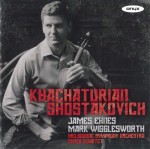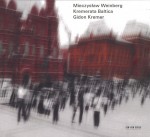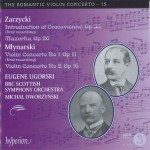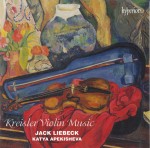 James Ehnes is back with a program of Russian music on his latest CD, Khachaturian/Shostakovich (ONYX 4121). Ehnes is joined by the Melbourne Symphony Orchestra under Mark Wigglesworth in a solid performance of the Khachaturian Violin Concerto. The slow middle movement is particularly lovely here, and the “Allegro vivace” final movement really sparkles. Recorded in the orchestra’s Melbourne concert hall, the violin seems to be a bit far back in the balance at times, but the overall sound is full and resonant.
James Ehnes is back with a program of Russian music on his latest CD, Khachaturian/Shostakovich (ONYX 4121). Ehnes is joined by the Melbourne Symphony Orchestra under Mark Wigglesworth in a solid performance of the Khachaturian Violin Concerto. The slow middle movement is particularly lovely here, and the “Allegro vivace” final movement really sparkles. Recorded in the orchestra’s Melbourne concert hall, the violin seems to be a bit far back in the balance at times, but the overall sound is full and resonant.
Shostakovich is represented by two works from his series of 15 string quartets – the Quartet No.7 in F Sharp Minor, Op.108 and the Quartet No.8 in C Minor, Op.110 – played here by the Ehnes Quartet, an ensemble formed in 2010 in which Ehnes himself is joined by violinist Amy Schwarz Moretti, violist Richard O’Neill and cellist Robert deMaine. The quartets, both written in 1960, are highly personal in nature, with the Op.110 in particular being essentially autobiographical. Dedicated “To the Victims of Fascism and War,” it quotes from six of Shostakovich’s earlier works and is dominated by his signature monogram D-S-C-H, the German designation for the notes D, E flat, C and B natural. It is a work that consistently reduced Shostakovich to tears, both in its composition and in performance. The playing here is dynamic and thoughtful, although perhaps a bit too polished at times; the aching, yearning sense of melancholy, desolation and despair so essential to the Op.110 in particular doesn’t always come through.
 Shostakovich’s influence is clearly audible in an outstanding 2-CD set of the music of Mieczysław Weinberg (1919-1996), the Polish/Soviet composer who, with Shostakovich’s help, settled in Moscow in the early 1940s. The two composers shared a close friendship and clearly influenced each other. For many years Weinberg’s music has been unjustly neglected, but that has gradually been changing, with an ever-increasing number of CDs exploring his extensive and hugely impressive output. This latest issue on the German ECM Records label (ECM 2368/69) featuring Gidon Kremer and the Kremerata Baltica makes a massive contribution to the growing appreciation of Weinberg’s music.
Shostakovich’s influence is clearly audible in an outstanding 2-CD set of the music of Mieczysław Weinberg (1919-1996), the Polish/Soviet composer who, with Shostakovich’s help, settled in Moscow in the early 1940s. The two composers shared a close friendship and clearly influenced each other. For many years Weinberg’s music has been unjustly neglected, but that has gradually been changing, with an ever-increasing number of CDs exploring his extensive and hugely impressive output. This latest issue on the German ECM Records label (ECM 2368/69) featuring Gidon Kremer and the Kremerata Baltica makes a massive contribution to the growing appreciation of Weinberg’s music.
Three of the works – the Concertino Op.42 for Violin and String Orchestra, the Sonatina Op.46 for Violin and Piano and the String Trio Op.48 – are from the period 1948-50, when toeing the Party line was more than just a sensible idea; Reading between the musical lines, the excellent booklet essay on Weinberg, refers to his being “under suspicion and shadowed day and night for five years from 1948 to 1953.” Like so much Soviet music of the time, these works are immediately accessible, but always with the sense of added meaning lurking beneath the surface.
The two other works – the monumental and towering Sonata No.3 Op.126 for Solo Violin from 1978, which Kremer rightly puts on the same level as the Bartók sonata, and the Symphony No.10 Op.98 for String Orchestra from 1968 – are from a period when the mature composer clearly enjoyed a greater sense of freedom, both politically and musically.
It’s a quite stunning set, with the performers outstanding in all respects. Kremer is as good as I’ve ever heard him, and this is clearly music very close to his heart.
 Hyperion’s The Romantic Violin Concerto Volume 15 features the music of Polish composers Emil Młynarski (1870-1935) and Aleksander Zarzycki (1834-1895) (CDA67790). Młynarski enjoyed a hugely successful international career as a violinist, conductor and composer, and is represented here by his two violin concertos, No.1 in D Minor Op.11 from 1897 and No.2 in D Major Op.16 from 1916. The style is typically late Romantic, with echoes of Wieniawski and Dvořák. The first concerto virtually disappeared after its initial success, and apparently remained unplayed until 2011. The second concerto is clearly a more confident and individual work that has stayed in the repertoire.
Hyperion’s The Romantic Violin Concerto Volume 15 features the music of Polish composers Emil Młynarski (1870-1935) and Aleksander Zarzycki (1834-1895) (CDA67790). Młynarski enjoyed a hugely successful international career as a violinist, conductor and composer, and is represented here by his two violin concertos, No.1 in D Minor Op.11 from 1897 and No.2 in D Major Op.16 from 1916. The style is typically late Romantic, with echoes of Wieniawski and Dvořák. The first concerto virtually disappeared after its initial success, and apparently remained unplayed until 2011. The second concerto is clearly a more confident and individual work that has stayed in the repertoire.
Zarzycki was primarily a virtuoso pianist before concentrating on composition and teaching. His Introduction et Cracovienne in D Major Op.35 and Mazurka in G Major Op.26 are both delightful virtuosic pieces. Violinist Eugene Ugorski is terrific, with a big tone and a large and constant vibrato which is perfectly suited to the style of these works. The BBC Scottish Symphony Orchestra under Michał Dworzyński provides excellent support.
 British violinist Jack Liebeck is superb on another outstanding Hyperion disc, this time a recital of Kreisler Violin Music, accompanied by pianist Katya Apekisheva (CDA68040). The Viennese violinist Fritz Kreisler was one of the most outstanding and instantly recognizable players in the first half of the 20th century. As the excellent booklet notes by the ubiquitous Tully Potter point out, Kreisler`s continuous use of vibrato was considered to be a revolutionary new style of playing; he was also renowned for his pure, sweet tone and his immaculately clean and accurate double-stopping.
British violinist Jack Liebeck is superb on another outstanding Hyperion disc, this time a recital of Kreisler Violin Music, accompanied by pianist Katya Apekisheva (CDA68040). The Viennese violinist Fritz Kreisler was one of the most outstanding and instantly recognizable players in the first half of the 20th century. As the excellent booklet notes by the ubiquitous Tully Potter point out, Kreisler`s continuous use of vibrato was considered to be a revolutionary new style of playing; he was also renowned for his pure, sweet tone and his immaculately clean and accurate double-stopping.
Although there is now ample opportunity for us to hear Kreisler himself in recorded performance – there are well over a dozen Kreisler CDs in the Naxos Historical series alone – he is still mostly remembered for his compositions, transcriptions and arrangements. Some of the compositions, of course, were the subject of a mini-scandal in the mid-1930s when Kreisler, who had passed them off as being by various Baroque and Classical composers, even claiming to own the original manuscripts, finally admitted that they were his own compositions. They are now usually listed as “in the style of…” The most well-known (and arguably the best) of these, the Pugnani Praeludium and Allegro, opens this recital in fine style. Other “in the style of…” compositions are the Boccherini Allegretto and the Cartier La Chasse, the latter full of the dazzling double-stops that Kreisler could handle so comfortably. As can Liebeck, quite clearly.
The four most popular Kreisler compositions – Schön Rosmarin, Tambourin chinois, Liebeslied and Liebesfreud – are here, the latter two, incidentally, having been originally passed off as being by the Austrian waltz composer Joseph Lanner. The lesser-known Syncopation, Toy Soldiers’ March, Caprice viennois, Polichinelle and Marche miniature viennoise are also included, along with the fascinating Recitativo and Scherzo for solo violin. Four Kreisler arrangements fill out the program: Gluck’s Mélodie from Orfeo; De Falla’s Danse espagnole from La vida breve; Dvořák’s Slavonic Dance in E minor; and Tartini’s G minor Sonata The Devil’s Trill, where Liebeck’s superb multiple-stopped trills bring an outstanding CD to a jaw-dropping conclusion.
There is a good deal of competition in recordings of this repertoire, but Liebeck and Apekisheva provide as lovely playing of these beautifully crafted works as you could wish to hear.



